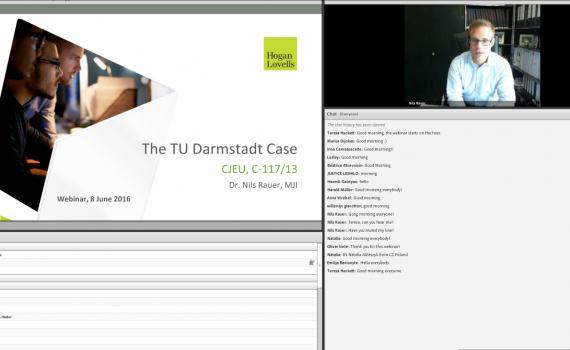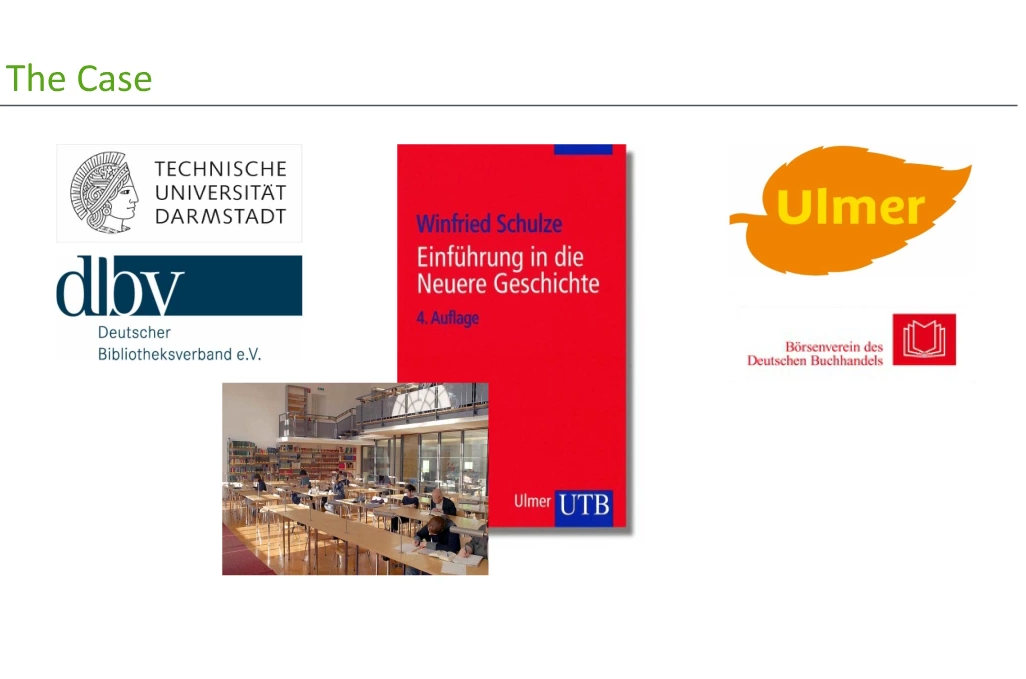
Quick links to the recording and slides.
Participants at a recent EIFL webinar were treated by a leading lawyer involved in the ‘TU Darmstadt’ case (reference C-117/13) to a concise analysis of the key issues decided by the Court of Justice of the European Union (CJEU) concerning use of copyright protected works by a library.
Over 90 people from 29 countries registered for the EIFL webinar in June 2016 that was led by Dr Nils Rauer, a Partner at the Frankfurt office of the international law firm, Hogan Lovells.
Dr Rauer represented the defendant, Technische Universität Darmstadt (TU Darmstadt), a research university in the German city of Darmstadt, that succeeded in a legal challenge from publisher, Eugen Ulmer KG, concerning the digital use of a book in the library.
The case is regarded as a significant boost for European libraries to digitize works in their collections and to make them available in library reading rooms. Since EU law has an important influence beyond Europe, the decision is also important for libraries outside Europe.
Making history
Dr Rauer began the webinar by setting out the key facts of the case that concerned a book entitled ‘Einführung in die Neuere Geschichte’ (Introduction to Modern History) by Winfried Schulze. The book is published by Eugen Ulmer.
The library digitized a copy of the book and made the digital version available on special, dedicated terminals in the library. The library rejected the publisher's offer to license the e-book version and the publisher sued TU Darmstadt.
Four aspects of dispute
The case revolved around an exception in the German copyright act known as ‘Communication of works at terminals in public libraries, museums and archives’ (section 52b) that implements Article 5(3)(n) of the European copyright Directive (the so-called ‘making available on dedicated terminals’ provision).
Dr Rauer explained the four legal issues at the heart of the dispute namely:
(1) may a library rely on exception 52b if the publisher is offering a digital version of the book? (Issue – priority of contracts);
(2) is there a right to digitize even though section 52b doesn’t say anything about digitizing? (Issue – narrow interpretation of exceptions);
(3) may the library offer the user the option to print the displayed pages? (Issue- combination of exceptions);
(4) may the library offer the user the option to save the displayed pages on a data carrier, such as a USB stick? (Issue- combination of exceptions).
Decision in favour of TU Darmstadt
The CJEU ruled in favour of TU Darmstadt on all four points.
As a result, libraries in the EU may now digitise in-copyright works in their physical collections and make them available to their users on dedicated terminals located in library reading rooms, irrespective of whether the publisher offers a digital version of the book or not.
In addition, library users may print out or save parts of the works to USB sticks. Such reproduction, however, must be within the boundaries of an exception for private or educational use (in Germany, the exception is Section 53 of the German copyright act).
In countries, such as Germany, that have decided on a discretionary basis to subject these exceptions to remuneration, publishers are entitled to receive fair compensation. Other EU member states that have chosen not to apply such remuneration, are not obliged to follow this path.
Law-makers grappling with new technologies
The TU Darmstadt case began at the Regional Court in Frankfurt, Germany in March 2009, and went all the way up to the Court of Justice of the European Union (CJEU) that made a preliminary ruling in September 2014 in favour of TU Darmstadt. The decision of the CJEU is binding on all EU member states.
In April 2015 judgment was handed down by the Federal Court of Justice of Germany.
During the proceedings over the five year period, the different courts produced differing results and gave alternating reasons for their decisions, showing how law-makers themselves are struggling to adapt the law to technological changes and new uses of digital content.
The case is not quite over yet. In a final move, the matter has been brought before Germany’s highest court, the Federal Constitutional Court, from which a final decision is expected sometime in 2017.
In November 2015, Poland became the first country in Europe to introduce legislation for the TU Darmstadt ruling.
Wide-ranging Q&A
Librarians from around the world who are considering the impact of the CJEU decision on work in their own libraries took the opportunity to ask a range of practical, legal and technical questions during a Q&A session with Dr Rauer.
The presentation and Q&A session are captured in the webinar recording available online.
EIFL would like to express our special thanks to Dr Rauer, Partner at the Frankfurt office of Hogan Lovells.
The webinar was coordinated by Barbara Szczepanska, Information Services Manager at Hogan Lovells Warsaw and EIFL Copyright Coordinator in Poland.
The webinar was kindly hosted by Nicolaus Copernicus University in Toruń, Poland.
WEBINAR RECORDING AND SLIDES
- View the recording (Youtube)
- Download the presentation slides in PDF format (976KB)
- Download the presentation slides in Powerpoint format (3.4MB)
Recommended reading
- LimeGreen IP News: limegreenipnews.com/2015/04/germany-technische-universitat-darmstadt-wins-landmark-case-with-hogan-lovells-digital-use-of-copyright-protected-works-in-public-libraries Germany: Technische Universität Darmstadt wins landmark case with Hogan Lovells – Digital use of copyright protected works in public libraries
- Kluwer Copyright Blog: Germany: No Digitisation without Reproduction
- The IP Kat: Copyright exceptions and user rights in Case C-117/13 Ulmer: a couple of observations
SHARE / PRINT









